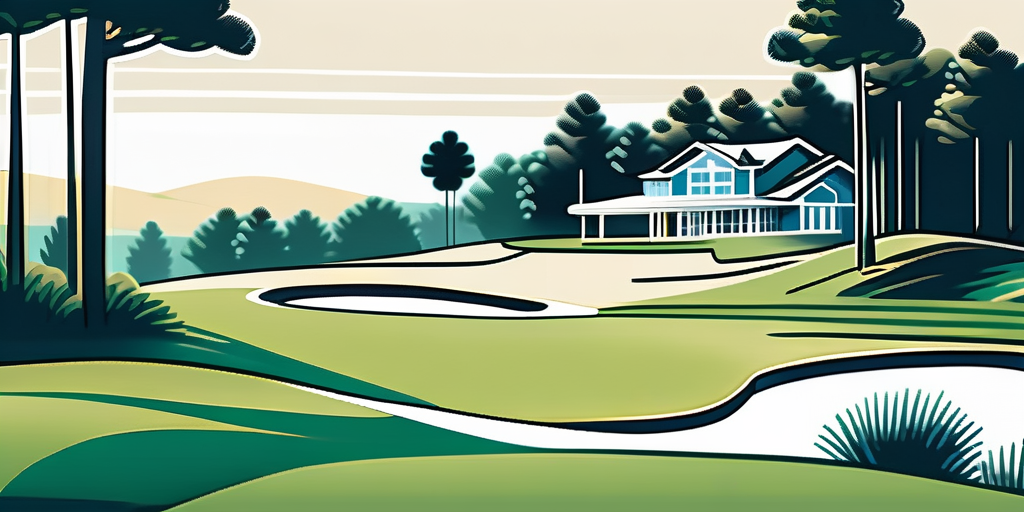
If you're considering investing in real estate and you love golf, then golf course homes might just be your perfect match. Living near the greens not only offers fantastic views and recreational opportunities, but it can also be a sound investment. This guide will walk you through everything you need to know about investing in golf course homes in the USA.
Golf course homes are properties located adjacent to or within a golf course community. These homes can range from luxurious estates with panoramic views of the fairways to cozy bungalows tucked away in serene greens. Often, these homes come with special perks such as membership opportunities to the golf course and access to other amenities like clubhouses and swimming pools. The architectural styles of these homes can vary widely, from modern designs featuring large windows that invite natural light, to traditional styles that blend seamlessly with the natural landscape, providing a unique charm that appeals to many buyers.

Beyond just the immediate views of rolling greens, many golf course communities foster a lifestyle that revolves around golf culture. This means not just attending events, but also participating in a close-knit community of fellow golf enthusiasts. It’s about more than the house—it's about the lifestyle! Many communities host regular tournaments, social gatherings, and even wellness events, allowing residents to engage with one another and build lasting friendships. The sense of camaraderie and shared interests creates an inviting atmosphere that can be hard to find in more conventional neighborhoods.
There are several reasons why investing in a golf course home can be appealing:
While living next to a golf course sounds dreamy, it’s not without its downsides. Here are a few to keep in mind:
Additionally, potential buyers should be aware of the layout of the course itself. Homes situated near tee boxes or greens may experience more errant golf balls than those located further away. This can lead to both safety concerns and potential damage to property. It’s wise to assess the specific location of a home within the community to ensure it aligns with your lifestyle and preferences.
Lastly, consider the seasonal changes in the golf course environment. While the lush greens of summer are inviting, winter months can bring challenges such as snow removal and maintenance of outdoor spaces. Some communities may have restrictions on landscaping or modifications during these months, impacting your ability to personalize your home. Understanding these seasonal dynamics can help you make a more informed decision about living in a golf course community.
Investing in golf course homes can offer a unique blend of personal enjoyment and financial gain. For those who love the sport, it’s a lifestyle choice that can pay off in several ways. The combination of a sought-after location, community amenities, and potential for capital appreciation makes these homes an attractive investment opportunity.

Moreover, during times of market recovery, golf course properties tend to recover faster than other types of residential real estate. With a well-chosen investment, you could find yourself enjoying equity growth while indulging in your love for golf. The allure of waking up to stunning views of manicured greens and having immediate access to the fairways can enhance your quality of life, making it not just an investment but a sanctuary where you can unwind and connect with nature.
Additionally, many golf course communities offer exclusive memberships that provide access to not only the golf course but also clubhouses, fitness centers, and social events. This sense of community can be invaluable, as it fosters relationships with like-minded individuals who share your passion for the sport. The lifestyle benefits can often outweigh the financial considerations, making it a holistic investment choice.
Before diving into the investment pool, you should consider several financial aspects:
In addition to these considerations, it's crucial to factor in ongoing costs such as homeowners association (HOA) fees, maintenance, and property taxes, which can be higher in golf course communities. Understanding these expenses will help you gauge the true cost of ownership and ensure that your investment remains financially viable. Furthermore, consider the potential for property appreciation over time; golf course homes often hold their value well due to their desirable locations and amenities, making them a smart long-term investment.
Every investment comes with risks, and golf course homes are no different. The primary risk lies in market fluctuations; if the housing market drops, so could the value of your property. It's also essential to keep an eye on the golf course's management and condition, as these factors can directly impact your property value. Changes in local regulations or shifts in interest in golf as a sport could also affect demand for these homes.
On the reward side, think about the enjoyable lifestyle, potential appreciation, and the ability to participate in a community that shares your interests. Done right, investing in a golf course home can lead to both personal satisfaction and financial growth! Moreover, the ability to host friends and family for golf weekends or social gatherings adds an extra layer of enjoyment to your investment. The combination of leisure and potential income generation through rentals can create a win-win situation for savvy investors who are passionate about the game.
Location is crucial in real estate, and golf course homes are no exception. Proximity to well-maintained golf courses, local amenities, and desirable neighborhoods can enhance a property’s value.
Look for homes situated on prime holes with stunning views; these typically demand a higher market price. Additionally, you should evaluate the surrounding community regarding safety, schools, and other factors that matter in your lifestyle. Access to shopping centers, restaurants, and recreational facilities can also significantly influence your daily life and the long-term appreciation of your investment. Furthermore, consider the climate and seasonal weather patterns, as these can affect both your enjoyment of the golf course and the overall desirability of the area.
Investing in a home next to a golf course takes more than just finding a property; you need to consider the golf course itself. Not all courses are created equal, as differences in management, maintenance, and design can impact your lifestyle and investment value.
Consider visiting the course multiple times during different times of the day. Engage with current residents and golfers to get an authentic feel for the course’s reputation and condition. Inquire about the course's maintenance schedule and the types of grass used, as these factors can affect playability and aesthetics. Additionally, research any upcoming renovations or changes in management that could influence the course's long-term appeal and your enjoyment as a homeowner.
When evaluating a golf course home, certain features can enhance your experience. Here’s a checklist of must-have qualities:
Additionally, consider the layout and flow of the home. Open floor plans that integrate living spaces with outdoor areas can enhance your lifestyle, making it easier to host gatherings or simply enjoy the serene views. Energy-efficient appliances and sustainable building materials can also add value, appealing to environmentally conscious buyers. Lastly, check for soundproofing features, as living near a golf course can sometimes mean dealing with noise from golf carts and players, which could impact your peace and quiet.
Many golf course communities operate under strict homeowner association (HOA) rules. These rules can dictate everything from home appearance to rental policies. Before investing, familiarize yourself with these regulations to ensure they align with your lifestyle. For instance, some HOAs may enforce guidelines on landscaping choices, requiring homeowners to maintain a certain aesthetic that complements the community’s overall look. This can include specific types of plants, colors for exterior paint, and even restrictions on outdoor decorations during certain seasons.

HOA fees are also a crucial part of the financial picture. These fees can vary widely, covering maintenance, security, and community amenities. Make sure you understand what these dues cover and what responsibilities they entail. In some communities, these fees might also contribute to the upkeep of shared facilities such as clubhouses, swimming pools, and fitness centers, enhancing your living experience. Additionally, inquire about any special assessments that may arise for unexpected repairs or improvements, as these can significantly impact your budget.
Alongside HOA regulations, zoning laws can also impose certain restrictions on what you can and can't do with your property. For instance, some communities may limit short-term rentals or certain types of renovations. These restrictions are often put in place to maintain the character of the neighborhood and ensure that property values remain stable. Understanding these laws is essential, especially if you plan to use your property as a vacation rental or if you envision making significant modifications to the home.
Research local zoning laws to ensure your investment aligns with your plans. Familiarizing yourself with these regulations in advance can save you from unexpected headaches down the road! Additionally, consider attending local zoning meetings or HOA board meetings to stay informed about any proposed changes that could affect your property. Engaging with the community can also provide insights into the neighborhood culture and help you build relationships with your future neighbors.
Finally, consider the tax implications. Owning a home near a golf course comes with property taxes that may differ from those in non-golf communities. It's a good idea to consult with a local tax professional to understand how your investment will be taxed based on the property’s value and location. In some cases, properties in golf course communities may be assessed at a higher rate due to their desirable location and amenities, which can significantly affect your annual tax burden.
Overall, investing in golf course homes can be a rewarding venture if you consider the benefits, challenges, and legal considerations involved. Additionally, be aware of potential deductions related to property taxes and mortgage interest, as these can help offset some of the costs associated with homeownership. Take your time, do your homework, and you might just find your perfect slice of paradise next to the greens!